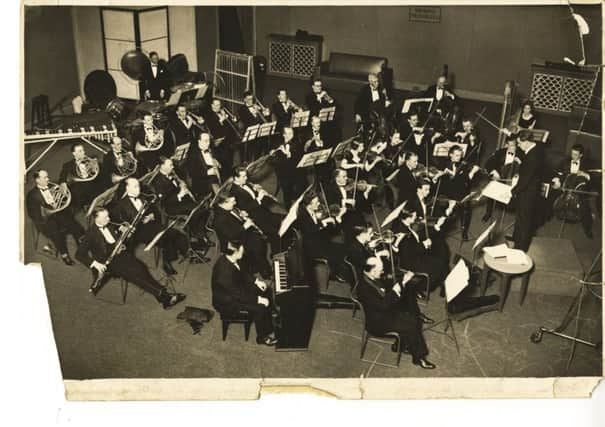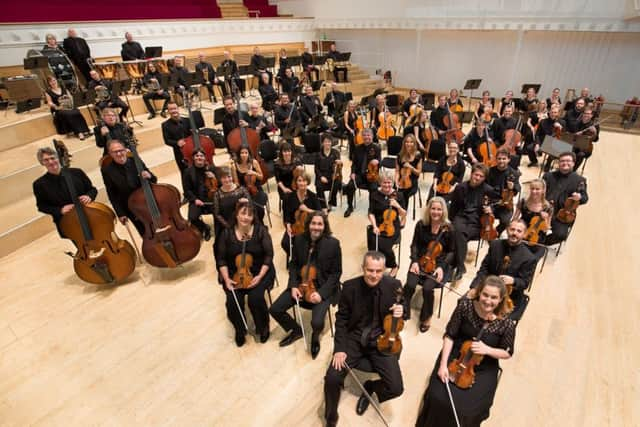The story of Glasgow’s 5SC Station Symphony Orchestra


The BBC Scottish Symphony Orchestra celebrates its 80th birthday this week in surprisingly muted tone. It’s not like the razzmatazz of the 50th anniversary 30 years ago, an occasion that led to the publication of a book tracing the orchestra’s history back to its establishment as the first salaried orchestra in Scotland on 1 December 1935. Nor is it the flamboyant knees-up held a decade later in 1995 at Glasgow’s old Broadcasting House to celebrate its 60th.
No, on the face of it this Thursday is a regular night’s work for the SSO, billed as the 80th Birthday Concert, and simply featuring the UK premiere of artist-in-association Matthias Pintscher’s Idyll, Mozart’s Oboe Concerto with the wonderful French oboist François Leleux, and Mahler’s Das Lied von der Erde.
Advertisement
Hide AdAdvertisement
Hide AdThere is, however, one little surprise in store. It’s a fascinating article published in the concert programme by former BBC SSO director Hugh Macdonald, which tells the story of Scotland’s very first broadcasting orchestra – and it’s not the SSO.


This one came into being 12 years earlier than the originally-named BBC Scottish Orchestra. It was 17 musicians known unimpressively as the 5SC station orchestra, who huddled daily in an attic in Glasgow’s Bath Street, churning out live broadcasts to a local listenership.
Early radio buffs will recognise 5SC as the call sign for the nascent Glasgow radio station, which operated – like later ones established in Edinburgh and Aberdeen – under the aegis of the new British Broadcasting Company.
These stations, says Macdonald, “were pretty much autonomous up until 1926 when things became more centralised under what was by then the ‘Corporation’. But the initial idea was clearly that music would be the main thing they would broadcast.”
That’s spelt out in the 1925 job advert for Glasgow’s first station manager, which Macdonald came across in an old newspaper. The incumbent was expected to be “a young versatile musician thoroughly acquainted with Scottish musical tastes and concert world”. And they found their man in Glasgow organist Herbert A Carruthers – originally from Edinburgh and possibly once assistant organist at St Mary’s Episcopal Cathedral – who had already fostered a passion for broadcasting by assisting a local electrician who operated an experimental transmitter from the roof of his Glasgow shop.
What amazes Macdonald is the fearless ambition Carruthers demonstrated in the few years he led the prototype BBC operation, and more especially from 1927 when the newly-formed Corporation appointed him exclusively as head of music. “Up till then,” says Macdonald, “he not only managed the entire station, but he arranged, accompanied and conducted the demanding daily schedule of live music, and even took part in iconic programmes like Children’s Corner, in which he played the part of Uncle Bert.”
“I don’t know how good a pianist he was, but throughout 1927, the centenary of Beethoven’s death, he played live on air all of Beethoven’s piano sonatas.” And his bravado didn’t stop there. Why not get the little station orchestra to do all nine symphonies?
And so he did. Some in the old St Andrews Hall, but many of them, Macdonald discovered, in a studio, now relocated to Blythswood Square, that was probably no bigger than a school classroom. “In the studio, they’d simply do a Beethoven symphony with the 17 players, Carruthers possibly filling in missing parts on the piano. One Glasgow listener actually wrote to the newspaper complaining he’d listened to a broadcast of Schubert’s Unfinished Symphony and the 2nd trombone part was missing.
Advertisement
Hide AdAdvertisement
Hide Ad“Out of the studio, it was a different matter,” says Macdonald, “and Carruthers would have augmented the numbers, probably with players from the part-time Scottish Orchestra, which later, in the 1950s, was to become the Scottish National Orchestra.”
Various references were used to identify the “fluid” pool of players, from the 5SC Station Symphony Orchestra to something called the Scottish Philharmonic Orchestra. There was even a choir known as the Scottish Wireless Singers. “Carruthers was happy to step aside as conductor when the occasion warranted,” Macdonald explains. He got Gustav Holst to conduct the Scottish premiere of The Planets, and the great Sir Henry Wood appeared as guest conductor in a City Hall concert.
Astonishingly, there were studio broadcasts of Wagner operas – Act 1 of both Die Walküre and Parsifal – as well as Stravinsky’s The Soldier’s Tale, and appearances by such renowned artists as singer Eva Turner and a young cellist called John Barbirolli.
But his heyday in Glasgow was short lived. “By 1929, with the ‘corporation’ now well-established and probably scrutinising budgets in time-honoured fashion, the BBC reduced the small orchestra to an octet,” says Macdonald. Carruthers left shortly after that, and appears to have continued his career in London as a freelance conductor and arranger.
“There are recordings by the Irish tenor Joseph Locke where he’s conducting the orchestra in sentimental Irish songs, probably his own arrangements,’’ Macdonald explains. “And I came across a couple of mentions of him conducting the BBC Scottish Orchestra itself during the war, where he’s billed as Lieutenant Herbert Carruthers. But I’ve no idea where he went beyond that, or even when he died.”
By then, of course, the revered Sir Ian Whyte had been elevated from his origins as Carruthers’ counterpart in Aberdeen to create and nurture the orchestra that now celebrates 80 years of visionary music-making, and which is recognised worldwide for its adventurous musical spirit. Maybe some of that spirit has its roots in the pioneering attic antics of Herbert A Carruthers.
• The BBC SSO’s 80th Birthday Concert is at the City Halls, Glasgow, 3 December, www.bbc.co.uk/bbcsso